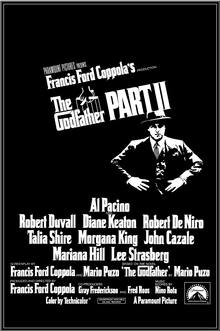
directed by Francis Ford Coppola
starring Al Pacino, Robert DeNiro, Robert Duvall
Thursday, and I'm finally posting the first review of the week. Well, I did have the brilliant idea to kick things off with The Godfather Part II, so there's that excuse. Another two-nighter!
It's a shame that four hour movies are such a rarity. I can't even remember seeing a film in theaters with an intermission. The Godfather Part II's length allows it to explore its story from both ends, expanding backwards and forwards while studying its characters. Today's 90-120 minute blockbusters just don't allow for that level of meditation. I know that film occupies and different space than the written word; still, it's a shame that films have this shortness imposed upon them, when the visual style is no less suited to detail than a novel.
Part II portrays the Corleones in a slightly less sympathetic light than first film. Both Vito and Michael are shown pursuing independence early in their lives - Vito, from one Don to another, and Michael, from his own Don father. However, this desire for control over their own life soon spirals into control of others. How much of this happens out of necessity or circumstance, and how much is the result of their own hunger for power?
The movie does not decide definitively. Rise and downfall occur simultaneously here. Even as Michael furthers his business and deflects threats from other bosses and the U.S. government, he has to deal with betrayal from the closest circles: his own brother in affairs of business, and his wife in affairs of a much more sacred nature. His question to his mother reflects that fact: did his father lose his family as a result of his work? It would appear not, but based on that question, maybe Michael is only slightly less successful than his father when it comes to holding his personal world together.
Both of their actions seem to be strongly motivated by family ties, but as always, the lines are blurry. Is Vito brave, even heroic, when he takes out Don Fanucci, or is he an opportunist who sees a chance for a power grab? Is Michael a reluctant patriarch doing what's best for the family, or is he captivated by power and perpetuating a cycle?
Villainy has never been so fascinating.
Coming Soon: Dial M for Murder, Hamlet, X-Men, Agora
No comments:
Post a Comment